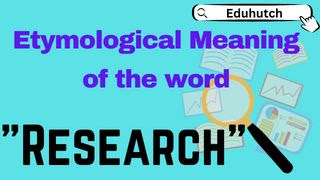Origin of 'Research'
The word "research" is a familiar term to anyone who has ever pursued knowledge or sought to better understand a particular subject. However, the origins of the term are often overlooked in everyday usage. In this article, we will explore the etymological meaning of the word "research" and how it has evolved over time.
 |
| Etymological Meaning of Research |
Etymological Meaning of the word "Research"
The word "research" has its roots in the Middle French language, specifically the verb "rechercher," which means "to search again." This verb is derived from the Old French "re-," which means "again," and "cerchier," meaning "to search." Thus, "research" initially referred to the act of searching again or examining something more closely.
The earliest usage of the term in English dates back to the 1570s and was first used in the context of seeking something out by means of investigation or inquiry. By the 1630s, the term was being used to describe a systematic investigation or inquiry into a particular subject or area of interest.
As time progressed, the meaning of "research" became more refined and specific. In the late 19th and early 20th centuries, the term was increasingly used to describe scientific and academic inquiries into various fields. During this time, the concept of "research" became increasingly important in the development of modern scientific methods and the establishment of academic disciplines.
Today, "research" has come to encompass a wide range of activities, from scientific investigations to market research and everything in between. In general, the term is used to describe any systematic investigation or inquiry into a particular topic or subject. It is often associated with the pursuit of new knowledge, the discovery of new ideas, and the advancement of understanding in a particular field.
In many ways, the evolution of the word "research" reflects the changing nature of human knowledge and the methods by which we seek to understand the world around us. From its early roots in Middle French to its modern usage in a variety of academic and scientific contexts, the term has come to represent the very essence of intellectual curiosity and the pursuit of knowledge.
What is the literal meaning of the word research?
In conclusion, the word "research" has a rich and fascinating etymology that speaks to the very heart of human curiosity and the desire to understand the world around us. Whether one is conducting scientific investigations, exploring new ideas in academic research, or seeking to better understand the complexities of the modern world, the concept of "research" remains a vital and essential part of human knowledge and understanding.
Read article about 'Research' 👇
👉 Meaning of Research
👉 Definitions of Research by Authors
👉 Characteristics of Research
References :
- Douglas Harper, "Research," Online Etymology Dictionary, accessed March 17, 2023, https://www.etymonline.com/word/research.
- Merriam-Webster, "Research," Merriam-Webster.com, accessed March 17, 2023, https://www.merriam-webster.com/dictionary/research.
- The Oxford English Dictionary, s.v. "Research," accessed March 17, 2023, https://www.oed.com/view/Entry/162098?redirectedFrom=research#eid.
- John M. Swales and Christine B. Feak, Academic Writing for Graduate Students: Essential Tasks and Skills, 3rd ed. (Ann Arbor: University of Michigan Press, 2012), 142.
- Wayne C. Booth, Gregory G. Colomb, and Joseph M. Williams, The Craft of Research, 4th ed. (Chicago: University of Chicago Press, 2016), 5.
- Theodore C. H. Cole, "Etymology and the History of Research," The Journal of Higher Education 23, no. 6 (1952): 302-306, https://www.jstor.org/stable/1977461.
- Robert K. Yin, Case Study Research and Applications: Design and Methods, 6th ed. (Los Angeles: SAGE Publications, 2018), 13.
- Michael C. Munger, "Using and Abusing Models: Rigor and Relevance in Political Science," APSA-CP: Newsletter of the APSA Comparative Politics Section 18, no. 2 (2007): 2-6, https://www.jstor.org/stable/44219636.
- James D. Lester and James D. Lester Jr., Writing Research Papers: A Complete Guide, 16th ed. (Boston: Pearson, 2020), 14-15.
- Anne Sigismund Huff and Mark Jenkins, "A Process Theory of Research-Based Learning," in The Oxford Handbook of Management Learning, Education and Development, ed. Steven J. Armstrong and Cynthia V. Fukami (Oxford: Oxford University Press, 2020), 85-103.











3 Comments
Handling coursework, part-time work, and tight deadlines was overwhelming. I looked for support and came across this assignment help in Adelaide. Their service was professional, timely, and followed university standards—perfect for students who need reliable academic assistance locally.
ReplyDeleteFind the best under graduate and post graduate programs and top colleges in India on KollegeApply. You can read about the courses, fees, admissions, and career paths in detail. Stay updated on College Admission 2025 and upcoming Entrance Exams 2025.
ReplyDeleteThanks for this clear and concise breakdown of the origins of “research.” Before diving deeper into any serious writing or study, I always run my drafts through plagcheck.com/ — it helps me respect the word’s original spirit: true investigation, not careless copying.
ReplyDelete